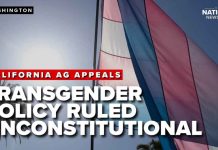
A brutal beheading in Dallas exposes how failed immigration enforcement under past leftist policies allowed a violent offender to remain in America, enraging families and reigniting calls for tough action.
Story Snapshot
- A Cuban national with a violent criminal history murdered Indian-American motel manager Chandra Mouli Nagamallaiah in Dallas after failed deportation efforts.
- President Trump condemned the killing, blaming previous administration’s lax immigration enforcement and vowing sweeping crackdowns.
- The suspect had been released under U.S. supervision after Cuba refused repatriation, highlighting glaring policy gaps.
- National outrage is fueling support for aggressive new deportation and border security measures to prevent similar tragedies.
Beheading in Dallas: Immigration Lapses Lead to Outrage and Action
On September 10, 2025, the Dallas community was shattered when Chandra Mouli Nagamallaiah, an Indian-American motel manager, was brutally murdered and beheaded by his Cuban co-worker, Yordanis Cobos-Martinez. The attack occurred in broad daylight at the Downtown Suites Dallas motel, witnessed by members of Nagamallaiah’s family. This shocking crime was committed by an individual who had entered the U.S. illegally and amassed a lengthy criminal record across multiple states. Despite his history, Cobos-Martinez had been released from prison earlier in the year after Cuba refused his deportation, a failure emblematic of past immigration policies that prioritized bureaucracy over public safety.
Details reveal that Cobos-Martinez had faced charges for carjacking, indecency, and even assault on a child in California, Texas, and Florida. He was released from prison in January 2025 after repeated failed attempts to deport him back to Cuba—whose government refused to accept him due to his criminal background. Instead of being detained, he was allowed to work and reside in Texas under U.S. supervision. This loophole, created by weak enforcement protocols, placed both the victim and the wider community at risk, culminating in a tragedy that could have been prevented with stronger border and deportation controls.
Trump Responds: “Time for Being Soft Is Over”
President Trump wasted no time in addressing the nation’s outrage, condemning the killing as a direct consequence of failed immigration enforcement under the previous administration. He called for maximum legal consequences for Cobos-Martinez and promised a sweeping crackdown on illegal immigrants with violent records. Trump’s remarks were echoed by key officials in his administration, including Secretary of Homeland Security Kristi Noem and Border Czar Tom Homan, who stressed the urgent need for tougher laws and effective deportation mechanisms. The administration’s stance is clear: protecting American communities requires ending soft-on-crime policies and restoring rule of law at the border and within the country.
Trump’s administration immediately pointed to policy gaps—such as the inability to deport violent offenders when their home countries refuse them—as unacceptable threats to public safety. New executive orders and legislative efforts have been announced to close these loopholes, with the Laken Riley Act mandating detention of immigrants charged with serious crimes and expanded use of military assets to secure the border. The administration is also ending policies that previously prevented law enforcement from acting in sensitive locations, ensuring no sanctuary for dangerous individuals anywhere in America.
Policy Failures: How the System Broke Down
This tragedy highlights the dangers of policies that left the U.S. unable to remove known violent criminals from the country. Under prior guidelines, even with serious convictions, Cobos-Martinez fell into a legal limbo when Cuba refused his repatriation. Instead of detention or removal, he was released to live and work freely—an outcome that left law-abiding Americans vulnerable. Critics argue that previous administrations prioritized political correctness and globalist cooperation over American safety, allowing violent offenders to slip through the cracks. The Dallas beheading is not the first such case, but its brutality has forced a reckoning over what many see as government overreach and constitutional neglect in the name of leniency.
Law enforcement leaders, as well as immigration policy experts, stress that the ability to promptly detain and remove dangerous non-citizens must be restored. The Trump administration’s aggressive approach—including expanded ICE raids, elimination of sanctuary zones, and pressure on foreign governments to accept deportees—seeks to ensure tragedies like this never happen again. This new direction is winning support among Americans who are frustrated by years of unchecked border crossings, violent crime, and a sense that government agencies are failing in their core duty to protect the public.
National Debate Intensifies Over Border Security and Deportation
The Dallas machete killing has become a flashpoint in the ongoing debate over immigration and public safety. Families across the nation are demanding answers and accountability, while political leaders pledge to overhaul a broken system. The Trump administration’s policies have already led to a sharp decrease in illegal border crossings, mass deportations, and new laws empowering law enforcement. However, legal challenges and political opposition continue, as some push back against the scale and scope of these reforms. For many conservatives, the lesson is clear: only a government that puts American lives and constitutional values first can prevent such senseless acts of violence from repeating.
Trump vows immigration crackdown after Cuban national charged in Dallas machete murder https://t.co/zvu3KcoUnU #FoxNews
— Rick Wortman (@RickWortman72) September 15, 2025
In the aftermath, communities are also grappling with the broader economic, social, and political impacts. The hospitality industry faces new scrutiny over workplace safety and hiring practices, while immigrant communities express fear and uncertainty amid intensified enforcement. Ultimately, the Dallas killing stands as a grim reminder of what is at stake when government fails to enforce the law and protect its citizens. The national conversation has shifted decisively toward restoring order, upholding conservative values, and ensuring the safety of every American family.
Sources:
Murder of Chandra Nagamallaiah – Wikipedia


